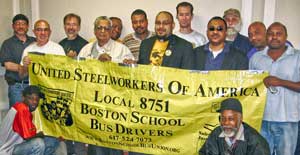Anti-imperialist leader from India talks to Boston workers
By
Frank Neisser
Boston
Published May 21, 2008 10:06 PM
Workers in Boston had a unique opportunity here May 18 to share views with
Manik Mukherjee, a veteran leader of working-class struggles from India. Mr.
Mukherjee is the general secretary of the International Anti-Imperialist and
People’s Solidarity Coordinating Committee and vice president of the All
India Anti-Imperialist Forum.
|
Manik Mukherjee, fourth from left, with
Boston workers and activists.
WW photo
|
Mukherjee has been at the forefront of organizing support and solidarity for
the people of Nandigram in West Bengal, India. Peasant women there have been on
the front lines of resisting the forced acquisition of their lands, which their
families have farmed for centuries, for the creation of a “special
economic zone” (SEZ) for Dow Chemical and other multinational
corporations. The people stopped the SEZ by digging up the roads and making the
bridges impassable, but they faced multiple massacres and mass rapes by West
Bengali state agents.
On his arrival in Boston, Mukherjee was greeted by a delegation including
United Steelworkers Local 8751 President Franz Mendez, Ed Childs of UNITE-HERE
Local 26, Bishop Filipe Teixeira OFSJC, members of the executive board of the
Archdale Roslindale Coalition and members of the International Action
Center.
His first meeting was with a group of about 20 leaders, organizers’
stewards and rank-and-file members of USW Local 8751, the Boston School Bus
Drivers Union, and the organizing staff of District Council 35, Painters and
Allied Trades. Workers from Haiti, Cuba, Angola, Brazil and three different
U.S. states attended—a workers’ United Nations, as Tony Hernandez
of DC 35 remarked in his opening comments.
Mukherjee described the impact of the 1,300 SEZs that have already been
established throughout India and the organizing in West Bengal of agricultural
laborers’ peoples committees to oppose them. Mass meetings were held,
explaining that the land to be acquired for the Dow Chemical hub was all arable
land—the breadbasket of Calcutta—that had provided the livelihood
of the people for centuries. Its takeover would lead to famine and massive
unemployment. Existing factories and industrialization would be destroyed to
make way for superexploitation, free from all labor laws and regulation as well
as taxes.
The people of Nandigram, according to Mukherjee, said, “No! We will give
our lives, but not our land.” He recounted the battle of Nandigram, where
police used torture, mass rape, burning down of houses and massacres, but were
unable to defeat the people. The solidarity slogan of progressives throughout
India became “My name, your name, our name is Nandigram!”
Mukherjee pointed to the need for worldwide solidarity and working-class unity
to fight back against the SEZs and the multinational corporations.
Several school bus union leaders inquired whether Mukherjee was planning to
visit Haiti. More than 80 percent of the members of Local 8751 are Haitian
immigrants. They expressed that Haiti, faced with U.N. occupying troops, mass
starvation and the rising cost of food, was in need of the kind of militant
struggle shown by the peasants of Nandigram. Mukherjee expressed keen interest
in making such a trip, and the union leaders agreed to work to arrange it.
Mr. Mukherjee next went to the Charlestown Bus Yard to speak to unionized
school bus drivers on their break. He gave a general description of the
conditions of workers in India, where more than 90 percent are unorganized,
where there is 40 percent unemployment, and where 36 percent live below the
poverty line, surviving on one meal a day. He talked of massive layoffs, no
jobs, loitering, begging and prostitution, and expressed the need for workers
of the whole world to unite against the capitalists and bring an end to wage
slavery.
Later, a reception was held for Mukherjee at Boston City Hall with
African-American city councilors Chuck Turner and Charles Yancey, and
representative of Korean-American City Councilor Sam Yoon. The councilors were
deeply moved by his account of the role of multinational corporations and SEZs
throughout India. Councilor Turner proposed drafting a City Council Resolution
denouncing special economic zones in general and Dow Chemical specifically for
their criminal role in Nandigram. This resolution could become a model for
other progressive city councils to demonstrate their solidarity and aid in
building a movement to stop this global injustice.
Finally, Mukherjee addressed an International Action Center forum. Bishop
Teixeira described the significant, 3,000-strong immigrant rights demonstration
on May Day in Everett, East Boston and Chelsea. Miya Campbell discussed
peoples’ resistance to the racist acquittal of the cops who killed Sean
Bell.
Steve Kirschbaum, who was part of an IAC delegation to Nandigram last November
led by former Attorney General Ramsey Clark, spoke of the 30,000-strong
anti-imperialist demonstration that greeted their delegation in Calcutta, and
how the SEZs are a worldwide strategy at the forefront of imperialism’s
global war against the workers.
Mr. Mukherjee said Nandigram represented the type of class struggle needed to
push back capitalism and move toward revolution. Organizing mass struggle and
class struggle, as in Nandigram, provides the opportunity to explain the need
for revolution. He gave a class analysis of the current stage of Indian
development as a developing imperialist power, discussing the impact of the
collapse of the Soviet Union on the global working-class struggle and the need
for all anti-imperialist forces to unite and renew the worldwide struggle
against imperialist war.
Jonathan Regis demonstrated the new Nandigram Solidarity Web site,
www.nandigramsolidarity.us, which includes videos and photos about Nandigram,
an online interactive petition demanding justice for Nandigram, and other ways
to get involved in supporting the struggle.
Articles copyright 1995-2012 Workers World.
Verbatim copying and distribution of this entire article is permitted in any medium without royalty provided this notice is preserved.
Workers World, 55 W. 17 St., NY, NY 10011
Email:
[email protected]
Subscribe
[email protected]
Support independent news
DONATE


